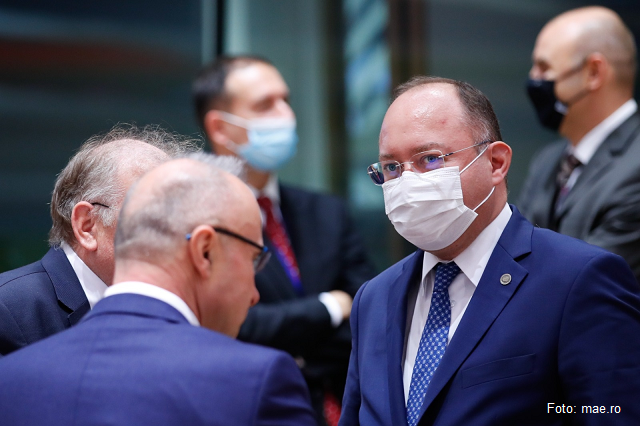Romania and the Eastern Neighbourhood
EU foreign ministers have agreed on fresh sanctions on Belarus, targeting those who use migrants as political weapon.

Corina Cristea, 16.11.2021, 13:50
The head of Romanian diplomacy, Bogdan Aurescu, participated, alongside counterparts from EU member and partner countries such as Armenia, Azerbaijan, Georgia, the Republic of Moldova and Ukraine, in the ministerial meeting of the Eastern Partnership. In Brussels, Aurescu presented Romanias stand on the Partnerships strategic priorities. These priorities were also outlined based on the conclusions reached after the diplomatic tour of the South Caucasus, of Minister Aurescu and his Austrian and Lithuanian counterparts, with the mandate of and in coordination with the EU High Representative Joseph Borell.
Among these priorities are strengthening the joint commitment for an ambitious and consolidated Partnership, that should reflect the need for recovery and consolidation of resilience and thorough reforms in the region. Aurescu pleaded for the consolidation of security in the Eastern Neighbourhood, the initiation of formats for dialogue with the partners interested, with a view to supporting them fight hybrid threats and a deeper involvement of the EU is solving frozen or prolonged conflicts in the Eastern Neighbourhood.
In Brussels, foreign ministers also worked on the preparation of the high level summit of the Eastern Partnerships, where Romania wants a concrete and visionary common declaration, adjusted to the future, to be adopted, Aurescu said. It is very important that the efforts made by associate states (Georgia, Moldova, Ukraine) with a view to EU integration to be acknowledged and supported, the Romanian official explained.
Ministers who convened in Brussels have unanimously agreed to extend the criteria that allows for additional sanctions against the Minsk regime. Once the framework that allows for such sanctions is extended, the EU can apply restrictive measures against individuals and entities that organize or contribute to illegal border crossings from Belarus to the EU. As of October 2020, the EU has been extending sanctions on the Minsk regime, following the violent actions against protesters who denounced the rigging of elections, elections that have not been recognised by Europe. 166 people, including the leader the Aleksander Lukashenko and 15 entities are already subject to European sanctions, while additional sanctions are currently being drawn up.
Aurescu also said that the Belarusian people must be further supported, and reminded of the Economic Plan for Democratic Belarus, drawn up by the European Commission following the proposal of Romanian President Klaus Iohannis, together with his Polish and Lithuanian counterparts, which presents the opportunities for this country after its transition to a democratic government. In the context of the situation in Eastern Ukraine, the Romanian official also reiterated the support for this countrys territorial integrity and mentioned the need to increase its resilience by maintaining a quick pace of reforms. (EE)






























